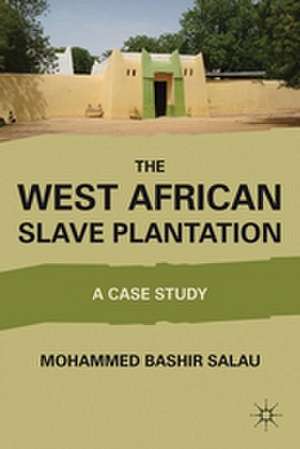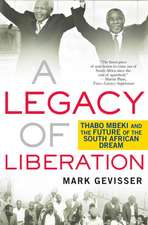The West African Slave Plantation: A Case Study
Autor M. Salauen Limba Engleză Hardback – 9 aug 2011
| Toate formatele și edițiile | Preț | Express |
|---|---|---|
| Paperback (1) | 347.82 lei 22-36 zile | +17.99 lei 6-12 zile |
| Palgrave Macmillan US – 9 aug 2011 | 347.82 lei 22-36 zile | +17.99 lei 6-12 zile |
| Hardback (1) | 386.81 lei 43-57 zile | |
| Palgrave Macmillan US – 9 aug 2011 | 386.81 lei 43-57 zile |
Preț: 386.81 lei
Nou
Puncte Express: 580
Preț estimativ în valută:
74.03€ • 76.100$ • 61.11£
74.03€ • 76.100$ • 61.11£
Carte tipărită la comandă
Livrare economică 14-28 aprilie
Preluare comenzi: 021 569.72.76
Specificații
ISBN-13: 9780230115903
ISBN-10: 023011590X
Pagini: 196
Ilustrații: XII, 196 p. 2 illus.
Dimensiuni: 140 x 216 x 18 mm
Greutate: 0.39 kg
Ediția:2011
Editura: Palgrave Macmillan US
Colecția Palgrave Macmillan
Locul publicării:New York, United States
ISBN-10: 023011590X
Pagini: 196
Ilustrații: XII, 196 p. 2 illus.
Dimensiuni: 140 x 216 x 18 mm
Greutate: 0.39 kg
Ediția:2011
Editura: Palgrave Macmillan US
Colecția Palgrave Macmillan
Locul publicării:New York, United States
Cuprins
Kasar Kano: Historical Setting The Development of Fanisau The Management of Plantations in the Fanisau Complex Socio-Cultural Life and Slave Resistance at Fanisau Slave Resistance, Control of Slave Labor and Groundnut Production
Recenzii
"Salau s study of a plantation complex in the Sokoto caliphate fills an important gap in the global studies of slavery and plantation systems. It is an exciting exploration into a system of agricultural production, the plantation, that has not been given sufficient consideration in African history; nor have we had sufficient African case studies to allow useful comparative studies with New World plantations. It uses a rich trove of oral histories, collected from among people who were either themselves slaves or who supervised slaves, to document the ways that African plantations were managed and slaves controlled and resisted. This is a richly textured study that is a major contribution to our understanding of plantations as economic and social systems and the agency of slaves who, in this case, were drawn into the cash crop economy of a West African colony." - Carolyn Brown, Professor, Department of History, Rutgers University
"This book is an important contribution to knowledge. By and large, Africanists do not have the data to write the kind of study which is available for village and plantation studies in the West Indies or the United States. Salau has, however, an exceptional source consisting of a large fund of oral interviews and a significant number of written sources. It makes it possible for him to provide a detailed account of how a rural plantation in Hausaland operated. I do not know of any other study which details the daily life of the slave economy in Africa and makes clear how the court interfaced with the rural economy. Such village studies are crucial for any kind of comparative analysis, and though there are other village studies, none give such an accurate picture of life on a slave plantation." - Martin Klein, Professor Emeritus, Department of History, University of Toronto
"This book is an important contribution to knowledge. By and large, Africanists do not have the data to write the kind of study which is available for village and plantation studies in the West Indies or the United States. Salau has, however, an exceptional source consisting of a large fund of oral interviews and a significant number of written sources. It makes it possible for him to provide a detailed account of how a rural plantation in Hausaland operated. I do not know of any other study which details the daily life of the slave economy in Africa and makes clear how the court interfaced with the rural economy. Such village studies are crucial for any kind of comparative analysis, and though there are other village studies, none give such an accurate picture of life on a slave plantation." - Martin Klein, Professor Emeritus, Department of History, University of Toronto
Notă biografică
MOHAMMED BASHIR SALAU is an Assistant Professor of History at the University of Mississippi, USA.













